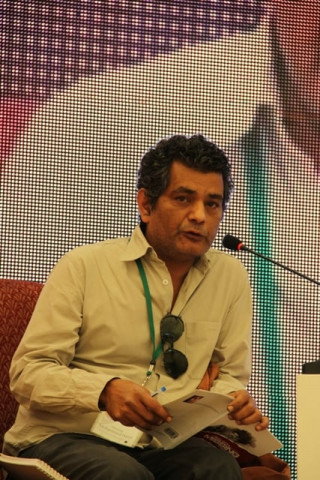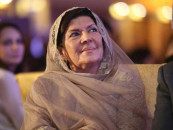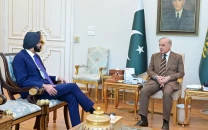I worry about Muslims
But mostly I worry about my kind of Muslims, those who are expected to explain to the world what real Islam is like.

Writer Mohammed Hanif at Karachi Literature Festival 2013. PHOTO: EXPRESS
I don’t worry too much about the Muslims who face racial slurs in Europe and America, the ones who are suspected of harboring murderous thoughts at their workplaces or those who are picked out of immigration queues and asked awkward questions about their luggage and their ancestors. I tell myself that at the end of their humiliating journeys they can expect privileges like running water, electricity and tainted promises of equality.
US professor suspended for saying Muslims, Christians worship 'same God'
I do worry about the Muslims who face extinction at the hands of other Muslims in their own homelands, usually in places where they are in a huge majority. My friend Sabeen Mahmud was murdered earlier this year, probably for not being a good enough Muslim, and it happened in this country, a country so Muslim that you can live your entire life here without shaking hands with a non-Muslim.
But mostly I worry about my kind of Muslims, those who are expected to explain to the world what real Islam is like. We so-called moderate Muslims are urged to take control of the narrative and wrest it away from the radicals — as though we were MFA students in a creative writing class struggling with midterm submissions, rather than 1.6 billion people of maddening diversity.
I worry about the pundits who end up on TV within hours of an atrocity and are required to condemn or defend and explain on our behalf. I worry about those nice folk who are supposed to remind the world that Islam is a religion of peace.
Trump’s anti-Muslim remarks ‘divisive, stupid and wrong’: British PM
Yes, the word Islam does mean peace. The dictionary says so. But it takes gumption to wave a dictionary in front of someone who has lost a daughter, a son or a partner, and say: “Here, I have something for you. Look. ‘Islam.’ It means peace.”
Saying that Islam is a religion of peace is like saying that Hinduism is about respecting cows and Buddhism is about the lotus position. Is Judaism basically a property dispute? And are Christians always looking for that other cheek?
Whenever I hear someone say Islam is a religion of peace I want to yell at them and say, “Hey, look behind you.”
It’s an impossible job, explaining Islam, whether you’re an observing Muslim (no alcohol, no bacon, no jihad) or an accidental Muslim (a bit of everything, and surely no jihad) or somewhere in between. But if we can’t do the explaining, we’re told, the least we can do is some condemning. Muslims don’t condemn enough, apparently.
We must support Muslims in US, says Google CEO
Yet if as a good Muslim I started to condemn everything bad that is done by Muslims, I wouldn’t have any time left to say my five daily prayers, let alone make macaroni and cheese for my kids or take them to the park. And I’d become a worse kind of Muslim.
We are often told that only a few Muslims are bringing a bad name to all of us. I feel that those few also include our representatives in the media who pretend they can save Islam’s reputation by going on TV and writing op-eds to reassure the world that we come in peace.
They tell the world that though the mass murderer was quoting from the Quran, he got the Quran wrong. Some of the gutsy ones don’t forget to add: What about your own secular mass murderers? They are suggesting that Muslim mass murderers should be treated like non-Muslim mass murderers, like those shooters on American college campuses or the invaders of Iraq. Should we thank them for striving for parity among mass killers? Did someone say peace?
They say that Islam teaches us to respect all religions. They again point to the Holy Book: Look, here’s Jesus; he is our prophet, too. But they don’t explain the point of having a religion if its god and its prophet are no bigger or better or faster than yours.
Crimes against Muslim Americans and mosques rise sharply
We are encouraged to look at Sufi Islam as a model of moderation. Yet Sufi Muslims, brandishing Rumi and whirling like couplets in a bad poem, don’t even pretend to offer any solution. When asked about Islam they say, let’s listen to some music. At least they are more honest than our spokesmen.
And thank you, our spokesmen, for reminding the world that Muslims are not a race. Some of us speak Chinese, others Swahili. Some of us are gay, painters, lawyers, prostitutes, pimps or drummers, and of course mass murderers. Muslims disagree over most things, about this life and the afterlife as well. I have a household of six and can never get us to agree on anything, even though one is an infant and two are dogs.
Who is a good Muslim? The kind who prays and leaves it to Allah? The kind who doesn’t pray and leaves it to Allah? The kind who thinks Allah is too busy and so takes matters into his own hands and takes a shortcut to the hereafter? Well, no, maybe not that kind, because as we told you, Islam is a religion of peace.
The most poetic bit Muslim pundits tell the world is that Islam says if you murder one human being you murder the whole human race. So how come Sabeen Mahmud is gone and the whole bloody human race, including her killers, is still alive?
This article originally appeared on The New York Times, a partner of The Express Tribune.



















COMMENTS
Comments are moderated and generally will be posted if they are on-topic and not abusive.
For more information, please see our Comments FAQ